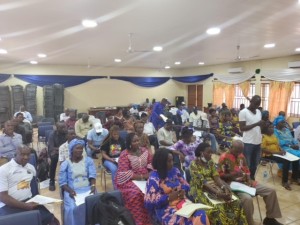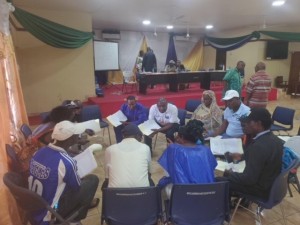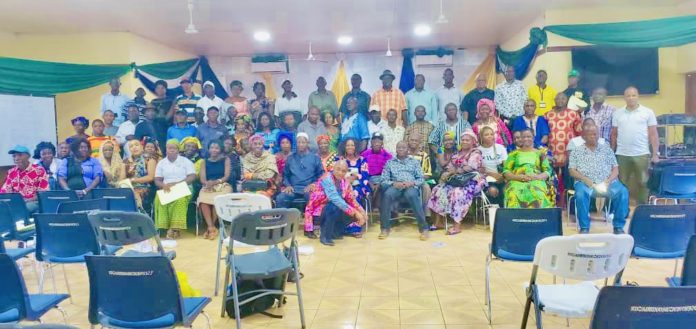By Foday Moriba Conteh
In a bid towards transforming the roadmap/plan regarding the establishment of Agricultural Commodity Associations and to enhance resource mobilization strategy to avoid over dependency in the country, the National Federation of Farmers of Sierra Leone (NaFFSL) with support from the Open Society Initiative of West Africa (OSIWA) has on Friday 17th December 2021 concluded two days national stakeholders consultative meeting on the theme: “Transforming the face of Agriculture through Farmer Organizations”. The two days meeting was held at the Moyamba District Council Hall in Moyamba District, Southern Sierra Leone.
In her welcome address, the National Women’s Leader of the National Federation of Farmers of Sierra Leone (NaFFSL), Mariama Keita, extended appreciation to OSIWA for their financial and mentorship support they have been giving to the organization to act as a force to reckon with in terms of policy advocacy and required timely support for farmers in the country.
He further applauded the leadership of the Ministry of Agriculture and Forestry and their committed professional and Technical Team for the warm acceptance of NaFFSL’s call and for creating for them the enabling environment to consult and listen to farmers’ views through this body and working together for the benefit of Sierra Leone and complementing the efforts of His Excellency the President and Government.
She called on other women to see farming as very important towards the development of the nation, of which he also used the opportunity to wish participants fruitful deliberations geared towards putting the Federation back on track through a clear and strategic road map.
Speaking during the ceremony, the National Coordinator of the National Federation of Farmers of Sierra Leone (NaFFSL), Brima Babo, stated that the National Federation of Farmers of Sierra Leone (NaFFSL) is an Umbrella Organization of farmers in the country, adding that the federation had been undertaking activities to help increase their productivity and enhanced household levels of food security.
He revealed that the meeting seeks the full contribution of farmers of different value chains and stakeholders in the sector to establish a strategic road map to buy-in into the current transformation and Government policy shift plans with capacity to represent its constituents.
Brima Babo, further revealed that the meeting identified and discussed four key objectives which includes establishing NaFFSL governance structure and oversight role in the development of agriculture;, NaFFSL’s Transformation roadmap/plan regarding the establishment of Agricultural Commodity Associations, Identifying NaFFSL Resource Mobilization Strategy to avoid over dependency, and engage Stakeholders on opportunities and relationship with other sector collaborates (MDAs, INGOs, NGOs, Private sector partners, Local Councils, CSOs etc.) for capacity building of NaFFSL.
On her part, the President of NaFFSL, Madam Yatta Samah started with the slogan “Women Power Men Support” of which she called on all to collaborate in order to support the development of farmers and the country as a whole.
She revealed that the federation is the umbrella organization of all farmers in country and they coordinate and represent all farmers in the country with the aim of strengthening farmers bargaining power for inputs and markets, sharing resources and expertise amongst themselves and leveraging resources and other opportunities for farmers in the country.
Madam Yatta Samah maintained that the federation has the largest membership of farmers in all districts in the country and the role of the federation towards the development of farmers cannot be overemphasized.
She further appealed to stakeholders present especially the Ministry of Agriculture to give the opportunity to the federation in order for organizations who want to engage in farming and before registration with the Ministry of Planning and Economic Development should also register with the federation which she said will help boost the federation.
Giving the keynote address on behalf of the Minister of Agriculture, Chief Agriculture Officer/Director General, Ministry of Agriculture and Forestry (MAF), Amara Adara Sheriff ,who also doubles as professional/technical head in the Ministry, stated that only farmers could change this country, looking at the higher numbers of farmers in the communities, towns, chiefdoms and headquarter towns and the country in general, adding that China in 1974 when they laid premium on an agrarian led economy started by establishing major agricultural districts, which was the foundation for their food security status and that in China a small farm area could be used to quadruple production using appropriate technology with few farmers.
He cautioned all against over dependence on rain fed agriculture as it is unreliable especially with the erratic weather and climatic conditions and Global warming trends, maintaining that the answer to sustainable agriculture is irrigation or perennial Swamps utilization, stating that the Ministry’s efforts towards the development of a National Irrigation master Plan for Sierra Leone of which he called on the federation to put pressure on MAF to create the enabling environment for farmers to succeed in the policy shift .
The Chief Agricultural Officer (CAO) concluded by noting that each district has 5 gender friendly power tillers awaiting distribution to deserving beneficiaries and that the Ministry and its partners are always ready to support the federation at all times
Other key stakeholders present who include the Deputy Chief Agriculture Officer/Deputy Director General, Ministry of Agriculture (MAF) Dr. Mohamed Ajuba Sheriff, Senior Technical Adviser to the Minister at MAF, Jack Jalloh, also spoke on technical policy relationship and the importance of the Federation and relationship with the Ministry.
Closing the event was a group work sessions of which stakeholders present were divided into four groups to look at the following: NaFFSL Governance structure and oversight role (chiefdom, District and National), Identify Resource Mobilization Strategy for NaFFSL, Farmer Mobilization and relationship with MDAs, NGOs, Private Sector and Local Councils, and NaFFSL capacity Building Strategy and opportunities.






